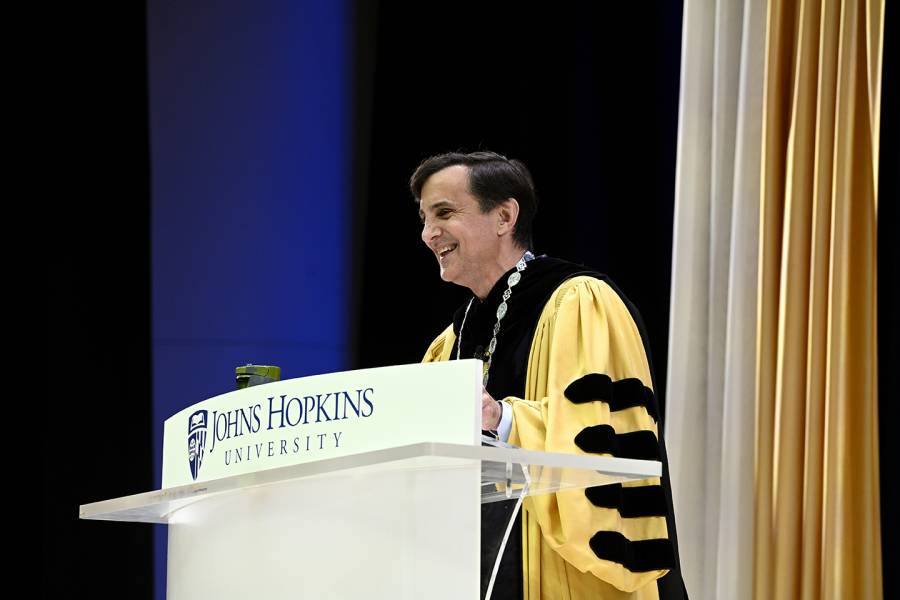Remarks as delivered by Johns Hopkins University President Ronald J. Daniels for delivery at the universitywide Commencement ceremony on May 21, 2020.
To our alumni and trustees, to our faculty and staff, to our parents, family members and friends; and most especially to our graduates, welcome to the Johns Hopkins University Commencement for the great Class of 2020!
Traditionally, Commencement is a time of optimism and possibility, of pomp and circumstance, as you line up by the thousands to take the stage in front of your professors, friends, and family. This year: You got this.
On the plus side, today's event did not require you to get out of your pajamas or even get up at all. Although I hope a few of you at least donned your mortarboards.
While here I am. Alone in Shriver. With no one to laugh at my "president" jokes. (Those are dad jokes, for university presidents.) I'm guessing nary a courtesy chuckle.
It's good to know that a global pandemic doesn't change everything. Still, let's face it: I know how much you were holding out for something different for your Commencement.
The Royal Farms Arena instead of your living room. A culmination of four years spent toiling—and caffeinating—and toiling again in Brody. Partying with your friends rather than relying on your parents to rally for a rousing game of "Virtual Commencement bingo" during these ... unprecedented times. Go ahead, check that box. You're welcome.
The bottom line is: We're not together in the way we hoped to be.
So, please, if you remember just one thing from this day, remember this: Your professors and I are bereft without you, and have been since we went virtual. It is a void that no amount of Zooming can possibly fill. We really miss you.
Of course, this is just one of many disappointments we are all facing in this time of COVID. Today was also supposed to be the closing of one great chapter of your life and the beginning of another, as you prepared to start challenging jobs, coveted internships and research opportunities, or stimulating graduate and professional degrees, in an economy that was firing on all cylinders. Instead, in the space of a few short months, reality has changed dramatically.
There is a Yiddish aphorism that my late father shared with me when he first learned he had just a few months of life ahead of him: "Mann tracht, un Gott lacht."
"Man plans and god laughs."
It is a statement of the wry capriciousness of life. Of our fragility. Of our vulnerability to circumstances beyond our control. And it is a particularly poignant sentiment now.
I have to confess: when we went online in March, it was hard for me to imagine that we wouldn't be back in short order.
"Man plans and god laughs."
Indeed, one can hardly anticipate how exactly things will unfold in fraught and uncertain moments like this one. My lifetime has been punctuated by a few of these moments.
I was born during the Cold War, and was well acquainted with its bone chilling lexicon of terms like "mutually assured destruction" and "nuclear winter."
I also, like so many of you, experienced 9/11 and the harrowing weeks and months immediately following, when it seemed as though rogue attacks and the fear that accompanies them might become—in the overused term of our moment—the new normal.
But, in truth, I have always felt my parents' and grandparents' generations understood far better than I do what it means to live in terrifying and uncertain times. They had watched the Nazis march across Europe, unleashing a protracted and devastating global cataclysm that shattered the modern world.
The COVID pandemic is different from these other moments in history, but there is no doubt that we are confronting a significant human tragedy and a convulsive societal shock whose ending is as yet largely unknown. We find ourselves asking: Will this be a discrete event or is it the beginning of an extended era of our lives?
So, it is not surprising that many people, perhaps you, or those you love, are experiencing high levels of despair, while many more are living in a state of suspended animation, anxiously awaiting a return to normalcy.
In this setting, it would be natural for you, the Class of 2020, to view this time as a protracted pause between college and the next chapter in your life. A waystation of sorts.
Yet, as I think back to the lessons of the past, gleaned particularly from the stories of my grandparents and their friends, it is clear that their lives were not put on pause during the dark war years. Their lives were defined by those years.
Despite truly horrific conditions, many in that generation managed not only to survive these years, but used this time to become who they were meant to be. The decisions they made and the actions they took gave enduring shape and substance to their lives.
The philosopher, Nobel laureate, and writer Albert Camus, who at great personal risk established himself as a critical voice of the Resistance in Nazi-occupied France, captured the essence of this form of flourishing and endurance in The Myth of Sisyphus, written in the early years of the Second World War.
As our Classics majors know, Sisyphus is the Greek mythological figure who was condemned for all eternity to push a boulder uphill each day, only to have it roll back at sunset. And each day, he would start all over again. It is often regarded as the ultimate story of futility.
Not for Camus. In his interpretation, Sisyphus is the master of his fate. He is a man whose interminable endeavor gives meaning to his life. As Camus writes, "the struggle towards the heights is enough to fill a man's heart."
What Camus teaches us is that however constraining external circumstances may be, however upended our plans, we cannot relinquish the imperative for life. We must do the work and take the actions that matter to us. Struggle towards the heights. And through that struggle fill our hearts with purpose and meaning.
Understood through this lens, this moment is not the prelude to the next chapter of our lives, it is the next chapter. It is a hard one. For so many, it may be the hardest they will ever live. And it is magnified by the omnipresent uncertainty as to how and when this will end.
But I know this: You are more than ready.
You bring to this moment a remarkable capacity for problem solving, creativity, compassion, and intellectual pursuit.
For the last three months—and all the years leading up to them—you pushed yourselves to ever greater heights in your academic endeavors and lives with the grace and persistence that would make Sisyphus himself cheer.
You have already begun to answer the call of this moment, by launching yourself into new research projects with your professors from thousands of miles away; by delivering stirring performances of Bach in your living room with fellow musicians from around the world; and by continuing to be of service, to our Baltimore community as well as to your own families to whom you are a source of hope for the future.
And so, so much more.
I know you will emerge from this moment stronger and more directed for having shouldered the weight of this time and, like Sisyphus, filling your hearts, knowing you did all that you could, every day, every moment, for as long as you had to.
Class of 2020, this is your gift. Embrace and embody it. Head up the hill and show us the way forward.
We are so very, very proud of you. Godspeed.
Posted in University News, Student Life









